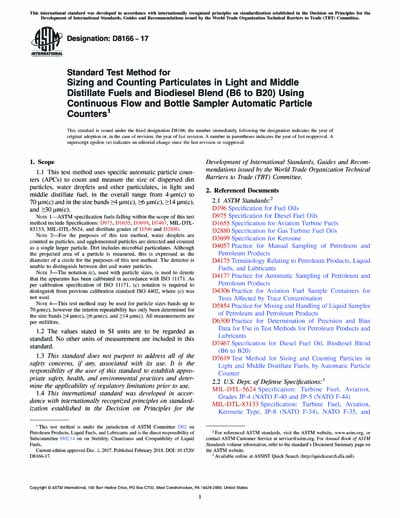Historical
ASTM D8166-17
Standard Test Method for Sizing and Counting Particulates in Light and Middle Distillate Fuels and Biodiesel Blend (B6 to B20) Using Continuous Flow and Bottle Sampler Automatic Particle Counters
1.1 This test method uses specific automatic particle counters (APCs) to count and measure the size of dispersed dirt particles, water droplets and other particulates, in light and middle distillate fuel, in the overall range from 4 µm(c) to 70 µm(c) and in the size bands ≥4 µm(c), ≥6 µm(c), ≥14 µm(c), and ≥30 µm(c).
Note 1: ASTM specification fuels falling within the scope of this test method include Specifications: D975, D1655, D3699, D7467, MIL-DTL-83133, MIL-DTL-5624, and distillate grades of D396 and D2880.
Note 2: For the purposes of this test method, water droplets are counted as particles, and agglomerated particles are detected and counted as a single larger particle. Dirt includes microbial particulates. Although the projected area of a particle is measured, this is expressed as the diameter of a circle for the purposes of this test method. The detector is unable to distinguish between dirt and water particles.
Note 3: The notation (c), used with particle sizes, is used to denote that the apparatus has been calibrated in accordance with ISO 11171. As per calibration specification of ISO 11171, (c) notation is required to distinguish from previous calibration standard ISO 4402, where (c) was not used.
Note 4: This test method may be used for particle sizes bands up to 70 µm(c), however the interim repeatability has only been determined for the size bands ≥4 µm(c), ≥6 µm(c), and ≥14 µm(c). All measurements are per millilitre.
1.2 The values stated in SI units are to be regarded as standard. No other units of measurement are included in this standard.
1.3 This standard does not purport to address all of the safety concerns, if any, associated with its use. It is the responsibility of the user of this standard to establish appropriate safety, health, and environmental practices and determine the applicability of regulatory limitations prior to use.
1.4 This international standard was developed in accordance with internationally recognized principles on standardization established in the Decision on Principles for the Development of International Standards, Guides and Recommendations issued by the World Trade Organization Technical Barriers to Trade (TBT) Committee.
Content Provider
ASTM International [astm]






